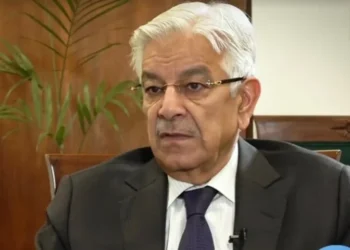Islamabad: The Supreme Court remarked during the hearing of the military court case that expanding the scope of authority is leading to the trial of civilians. The question is whether civilians can be tried in such courts or not.
The Chief Justice of the Constitutional Bench of the Supreme Court, Justice Aminuddin Khan, presided over the hearing of the military court case. Khawaja Haris, the lawyer for the Ministry of Defence, argued that the Supreme Court had previously stated that civilians could be court-martialed under the military.
Justice Jamal Mandokhail inquired about who the affected party is and who has filed the appeal in this case. Lawyer Khawaja Haris replied that the appeal had been filed by the Ministry of Defence.
Justice Jamal Mandokhail remarked that the Ministry of Defence is an executive institution, and if a crime is committed against the executive, can it act as its own judge? The Constitution clearly divides powers, and it explicitly states that the executive cannot play the role of the judiciary. This is a fundamental constitutional question in the military court case.
Khawaja Haris informed the court that the executive can make a decision only if no other forum is available. Justice Jamal Mandokhail responded that there is a forum available through anti-terrorism courts, so how can the executive act as a judge? Khawaja Haris agreed with the point.
Justice Jamal Mandokhail also remarked that the Army Act is specifically applicable only to members of the armed forces. Khawaja Haris clarified that the Army Act is not limited to the armed forces; it includes other categories as well. He further stated that he would address this point later, noting that the Army Act cannot be challenged based on fundamental constitutional rights.
Justice Jamal Mandokhail further commented, questioning whether a citizen loses their fundamental rights upon joining the army and whether military courts fall under Article 175 of the Constitution. He raised hypothetical situations regarding military courts and trials for civilians in such circumstances.
Khawaja Haris stated that he could not respond to such a situation. Justice Musarrat Hilali commented that this is indeed a relevant question. Justice Muhammad Ali Mazhar noted that the answer was simple: if the citizen commits an offense under the Army Act, a trial will proceed, but standing near a check-post would not be an offense.
Khawaja Haris argued that Article 175 does not apply to military court trials. Justice Jamal Khan Mandokhail remarked that the Army Act was brought to ensure discipline in the armed forces. Khawaja Haris stated that if a civilian joins the armed forces, they cannot challenge matters in regular courts under their fundamental rights.
Justice Jamal Khan Mandokhail noted that martial law had been imposed in the country for 14 years. The Ministry of Defence’s lawyer responded that if a civilian interferes in the performance of the armed forces’ duties, the Army Act applies. He asked whether trying to approach a check-post would also interfere with the armed forces’ duties.
Justice Muhammad Ali Mazhar stated that the case has two parts: one regarding declaring certain sections of the Army Act unconstitutional, and the second regarding the trial of civilians in military courts. Justice Musarrat Hilali emphasized that Justice Jamal Khan Mandokhail’s question is crucial.
Justice Musarrat Hilali further asked where a civilian dispute near a check-post would be tried. Justice Muhammad Ali Mazhar confirmed that the Army Act specifies the crimes to which it applies. Justice Musarrat Hilali remarked that expanding the scope of authority is leading to the trial of civilians, and the core question is whether civilians can be tried or not.
The Supreme Court postponed the hearing of the case regarding civilian trials in military courts until tomorrow.





















